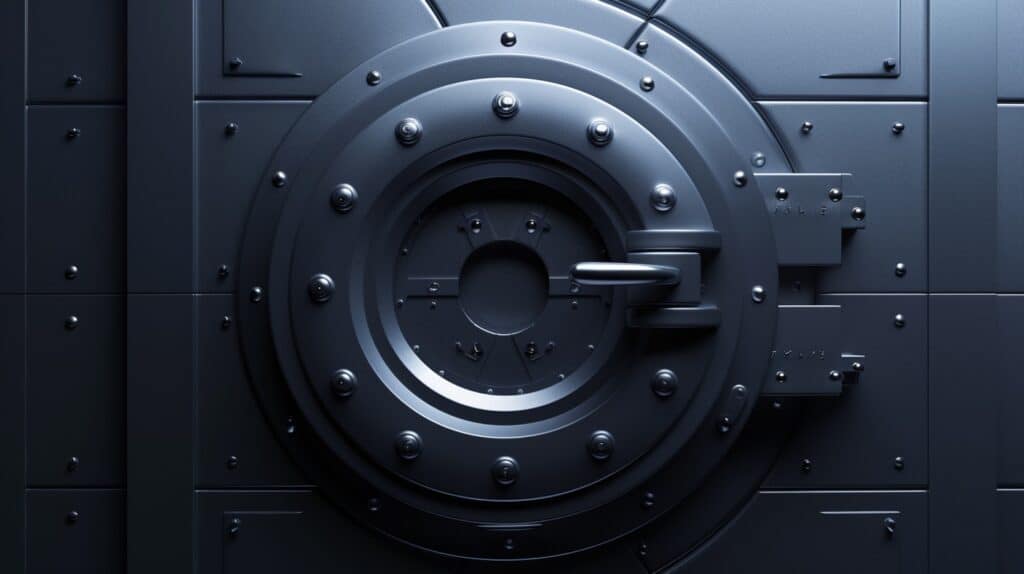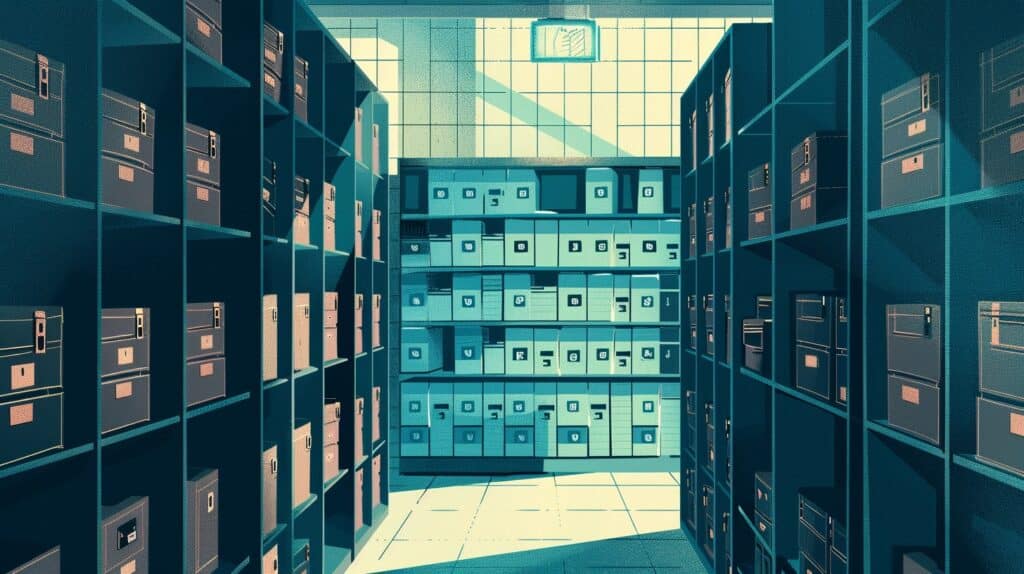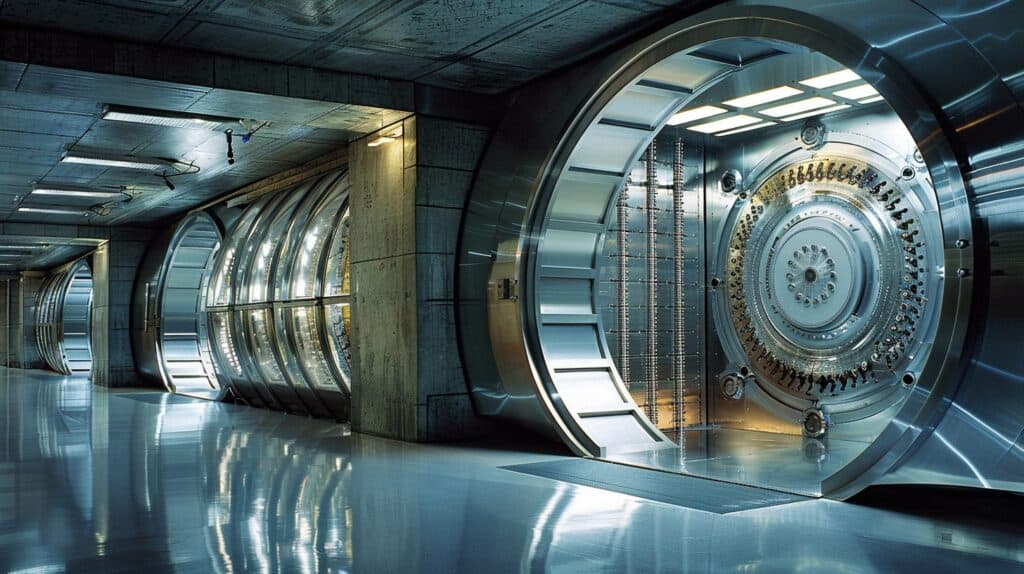Storing your will securely is crucial for protecting your final wishes. Many people overlook this vital step, risking their estate plan’s effectiveness. A properly stored will ensures your assets are distributed according to your desires.
Drawing from my experience as an executor on the estates of various family members, I’ve seen the consequences of misplaced or damaged wills. This guide outlines 6 secure options for safeguarding your will. 2
Your will is a key legal document that requires careful handling. It must be protected from theft, disasters, and unauthorized access. At the same time, it needs to be accessible when needed.
This article explores modern storage solutions, from traditional safe deposit boxes to digital options. You’ll learn the pros and cons of each method to make an informed decision. 1 3
Key Takeaways
Keep your will in a secure place like a fireproof safe, bank safe deposit box, or with your lawyer to protect it from damage or loss.
Tell your executor and a few trusted people where your will is stored so it can be found when needed.
Consider modern options like secure online cloud storage or electronic wills, which are now legal in some states like Arizona and Florida.
Make copies of your will carefully and label them as “COPY” to avoid confusion, giving them only to key people like your executor.
Review and update your will’s storage location regularly, especially if you change executors or move documents.
Table of Contents
Best Practices for Storing Your Will

Keeping your will safe is crucial. Here are some smart ways to store it securely.
Utilizing a Secure Storage Facility
A secure storage facility offers a robust solution for will safekeeping. These facilities, like personal storage options in Colorado Springs – NSA Storage, provide climate-controlled units with advanced security measures.
Your will remains protected from theft, fire, and water damage. 1 Many facilities offer 24/7 access, allowing you to retrieve your documents when needed.
Fireproof safes within these facilities add an extra layer of protection for your original will. 2 LawSafe® software complements physical storage by organizing digital copies and enabling secure sharing with your “Circle of Trust®“.
This dual approach ensures your will’s safety and accessibility in emergencies.
Storing with Your Estate Planning Attorney
Moving from secure storage facilities, another option is entrusting your will to your estate planning attorney. This choice offers robust security and professional oversight. Estate lawyers implement stringent measures to safeguard important documents.
They follow specific protocols for document protection and retrieval. 3
Storing your will with an attorney ensures legal expertise is readily available. Your executor can easily access the will when needed. However, fees may apply for this service. It’s crucial to provide your executor with the lawyer’s contact information.
Potential drawbacks include accessibility issues if the attorney retires or passes away. 2
A well-stored will is the cornerstone of a solid estate plan.
Using a Safe Deposit Box
Transitioning from storing your will with an estate planning attorney, another secure option is a safe deposit box. Banks offer these locked containers for heightened protection against theft, fire, and damage.
Safe deposit boxes provide 24/7 security, surpassing home storage options. Access is limited to bank hours, which can be inconvenient in emergencies. Costs vary, with annual fees ranging from $20 to $200 depending on box size and location.
Courts may require orders to access safe deposit boxes after death, potentially delaying the probate process. This restriction safeguards privacy but can hinder executor duties. Some banks allow joint access, easing concerns about post-death retrieval.
Always inform a trusted person about the box’s location and contents to avoid complications. 4
Keeping it at Home
Storing your will at home offers easy access and updates. 2 Use a fireproof, waterproof safe for protection. Small lockboxes risk misplacement or theft. A unique alternative: seal the document in a heavy-duty freezer bag and place it in your deep freezer.
This method guards against fire and water damage while keeping the will readily available. 3 Home storage eliminates attorney fees and safe deposit box rental costs.
Leaving it with Your Executor
Entrusting your will to your executor offers quick access when needed. 6 This method hinges on the executor’s reliability and organizational skills. 3 The executor must safeguard the document and respect its confidentiality.
Executors may change over time, potentially leading to complications in will retrieval.
A trustworthy executor is the guardian of your final wishes.
Inform your executor of the will’s location and provide necessary access information. This approach balances convenience with privacy concerns. 6 It’s crucial to choose an executor you trust implicitly with sensitive financial and personal details.
Consider updating your executor periodically to ensure continued reliability and accessibility.
Evaluating the Advantages and Disadvantages of Storage Options

Choosing where to store your will isn’t a one-size-fits-all decision. Each option has its perks and pitfalls, from lawyer safekeeping to home storage.
Benefits and Downsides of an Estate Planning Lawyer
Estate planning lawyers offer secure will storage. This service comes with pros and cons. 7
| Benefits | Downsides |
|---|---|
| • Reduced risk of loss or damage • Expert legal advice on hand • Ensures will is up-to-date • Simplifies probate process | • Heirs may feel pressured to use the lawyer • Potential storage fees • Limited access to documents • Lawyer might retire or relocate |
Lawyers safeguard wills in fireproof safes. 2 They update documents as laws change. Access is restricted for privacy. Fees vary by firm. Some offer free storage.
Executors need the lawyer’s contact info. This prevents issues if you’re in a car accident. Always inform family about your will’s location.
Storing with a lawyer isn’t mandatory. Consider your budget and preferences. Weigh the pros and cons carefully.
Pros and Cons of a Safe Deposit Box
Safe deposit boxes offer secure storage for important documents like wills. Here’s a breakdown of their pros and cons:
| Pros | Cons |
|---|---|
| • Enhanced security with alarm systems and surveillance • Protection from theft, fire, and natural disasters • Controlled access limits unauthorized viewing • Peace of mind for document safety | • Access restricted to bank hours • Potential fees based on box size and location • Complications during probate process • Not ideal for items needed in emergencies |
Banks provide robust security measures for safe deposit boxes. These include alarm systems, surveillance cameras, and limited access. The controlled environment protects documents from theft, fire, and natural disasters. Access restrictions prevent unauthorized viewing of sensitive information. 8
Fees for safe deposit boxes vary. Costs depend on box size, bank location, and specific policies. Some banks offer free boxes with certain account types. Others charge annual fees ranging from $20 to $200 or more.
Probate complications can arise with safe deposit boxes. Executors may face challenges accessing the will if it’s stored in the deceased’s box. This can delay the probate process. Some states have laws allowing limited access for will retrieval. 9
Safe deposit boxes aren’t ideal for items needed quickly in emergencies. Access is limited to bank operating hours. This can cause issues if urgent access is required outside business hours or on holidays.
Advantages and Drawbacks of Home Storage
Storing your will at home offers convenience and control. Here’s a breakdown of the pros and cons:
| Advantages | Drawbacks |
|---|---|
| • Easy access for updates • No storage fees • Privacy from third parties • Immediate availability | • Risk of loss or damage • Potential theft • Family members may tamper • Executor might not find it |
A fireproof, waterproof safe enhances security. Combine physical storage with an encrypted online vault for added protection. 10 Keep digital copies in the cloud as backup, but maintain the original hard copy. Notify trusted individuals about the will’s location to ensure its discovery when needed. 11
Pros and Cons of Executor’s Possession
Executors hold a crucial role in will management. Their possession of the document comes with distinct advantages and drawbacks. 6
| Pros | Cons |
|---|---|
| • Immediate access upon death • Ensures executor knows location • Simplifies probate process • Reduces risk of loss or damage | • Privacy concerns if relationship changes • Potential for document tampering • Difficult to update without executor’s knowledge • Executor may move or become unreachable |
Executors must be trustworthy. Provide access info to a backup person. Consider changing executors? Update will location details. Digital copies enhance security. 8 Regular check-ins maintain document integrity.
Exploring Modern Solutions for Will Storage

Modern will storage goes digital with secure cloud options and electronic wills… Keep reading to learn how these tech-savvy solutions can safeguard your final wishes.
Secure Online Cloud Storage Options
Secure online cloud storage offers a modern solution for will safekeeping. Services like Everplans and FidSafe provide encrypted digital vaults for important documents. 12 These platforms allow easy updates and sharing with trusted individuals.
Only 30% of states currently recognize electronic wills as legally binding. Users must stay vigilant about cybersecurity and understand breach protocols. Most cloud storage services charge fees for document storage and management. 13
The Legality and Use of Electronic Wills
Electronic wills have gained legal recognition in states like Arizona, Colorado, and Florida. 14 These digital documents differ from traditional wills in format, creation, and signing processes.
Some states impose strict storage requirements for e-wills, ensuring their integrity and authenticity. 15.
Keeping a hard copy of the original will remains crucial, even with electronic options. E-wills offer convenience, but may face challenges in probate courts unfamiliar with digital formats.
Laws governing electronic wills vary by state, so consult an estate planning attorney to ensure compliance with local regulations.
Communicating About Your Will

Letting key people know about your will’s location is crucial. Want to learn more about secure storage and modern options for your will? Keep reading.
Notifying Relevant Parties
Informing key individuals about your will’s location ensures smooth execution. Here’s a list of essential steps to notify relevant parties:
- Tell your executor: Provide them with the will’s exact location and any necessary access details.
- Inform beneficiaries: Let them know they’re included, but avoid sharing specifics to prevent conflicts. 16
- Notify your attorney: Keep your lawyer updated on the will’s whereabouts for legal support.
- Update family members: Share basic info with close relatives to avoid confusion later.
- Inform financial institutions: Notify banks and investment firms about your estate plans.
- Contact life insurance companies: Ensure they have current beneficiary information on file.
- Advise business partners: If applicable, inform them about succession plans in your will.
- Communicate with charities: If you’ve included charitable donations, let the organizations know.
- Provide details to safe deposit box co-signers: If your will is stored there, they’ll need access. 2
- Update digital asset managers: Inform them about your wishes for online accounts and data.
Distributing Copies Carefully
Distributing copies of your will requires caution and discretion. Strategic sharing can prevent confusion and conflicts among your loved ones.
- Limit distribution to trusted individuals only
- Provide copies to your executor and alternate executor
- Give a copy to your attorney for safekeeping
- Keep the original in a secure location, like a safe deposit box. 3
- Inform recipients that newer versions may exist
- Update all copy holders if you make changes to your will
- Consider digital copies on secure cloud storage with password protection
- Label copies clearly as “COPY” to avoid confusion with the original
- Instruct recipients to keep the contents confidential
- Avoid giving copies to potential beneficiaries to prevent disputes. 17
- Maintain a list of who has copies for easy updates later
People Also Ask
Where’s the safest place to store my will?
Keep your will with a solicitor, in a bank safe, or with the register of wills. Digital copies are okay, but the original is key for probate.
Can I keep my will at home?
You can, but it’s risky. Fire, theft, or loss could cause problems. Better options: attorney’s office or safe deposit box.
How do digital will storage services work?
They offer secure online storage for wills and other important docs. You’ll need passwords to access. Check their privacy policy first.
Should I tell someone where my will is?
Yes! Tell your executor or a trusted person. Include info on life assurance, pensions, and investments too.
What happens if no one can find my will?
If your will’s lost, intestacy laws kick in. This might not match your wishes for legacies or charity donations.
Do I need to update where I keep my will?
Review your will’s location when life changes happen. Move it if needed. Keep it safe from debts and the cost of living crisis.
References
- ^ https://opelon.com/store-estate-planning-documents/
- ^ https://www.lawsafe.com/blog/where-to-store-a-will/ (2021-10-25)
- ^ https://www.nolo.com/legal-encyclopedia/how-to-keep-your-will-safe.html (2023-06-13)
- ^ https://www.simgil.com/blogs/4643/index.php/2023/01/17/should-i-keep-my-will-in-a-safe-deposit-box/ (2023-01-17)
- ^ https://www.andrewmayers.com/faqs/should-i-put-my-will-in-a-safe-deposit-box-quick-answer-no-.cfm
- ^ https://www.leavealegacync.com/2017/02/23/the-good-the-bad-and-the-ugly-5-options-for-storing-your-will (2017-02-23)
- ^ https://www.daytonestateplanninglaw.com/keep-will-at-lawyers-office/ (2019-05-10)
- ^ https://ohalllaw.com/pros-and-cons-of-using-a-bank-safety-deposit-box-for-storing-estate-planning-documents-insights-from-tampa-probate-lawyers/ (2023-08-24)
- ^ https://www.bankrate.com/banking/savings/safe-deposit-box-etiquette-what-not-to-put-in-your-safe-box/ (2024-06-24)
- ^ https://carbidesecure.com/resources/cloud-storage-vs-local-storage-19-pros-and-cons/
- ^ https://www.securestorageservices.co.uk/article/11/pros-and-cons-of-cloud-storage
- ^ https://www.esecurityplanet.com/cloud/most-secure-cloud-storage/ (2024-03-21)
- ^ https://www.unite.ai/cloud-storage-solutions/
- ^ https://updf.com/knowledge/electronic-will/ (2024-02-20)
- ^ https://harborlawfirm.com/blog/electronic-wills-everything-you-need-to-know/ (2023-08-28)
- ^ https://keystone-law.com/executor-not-communicating-with-beneficiaries/ (2024-04-29)
- ^ https://www.lawhelp.org/dc/resource/frequently-asked-questions-about-wills




